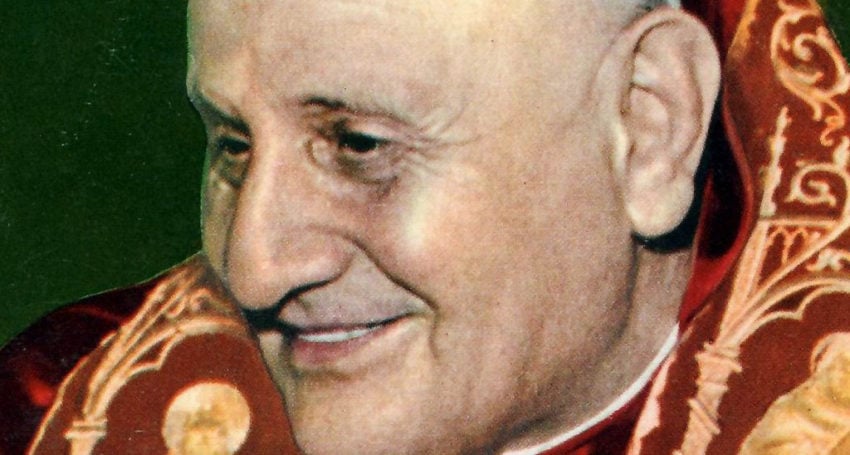Pope John XXIII: reformer, reconciler, diplomat and accidental saint
Features
“I have read of a newspaper drawing, published following the death of John XXIII, of the earth shrouded in mourning with the caption ‘A Death in the Family’. It is fitting to continue to give thanks for the life he inspired in this world-wide family,” says The Rev’d Canon Dr Don Edwards, as Pope John XXIII is commemorated in our Lectionary on 3 June

Angelo Giuseppe Roncalli was elected Pope (on the 12th ballot) in 1958, taking the name John XXIII. He died on 3 June 1963, and was canonised by Pope Francis in 2014.
Throughout his Pontificate he exceeded expectations, seeking to reunite divided Christians and promoting world peace during the Cold War period. He received visits from Eastern Orthodox, Anglican and Protestant leaders, and was noted for relating warmly to adherents of other faiths.
He convoked an Ecumenical Council (Vatican II) in 1962. In that same year, he wrote in his journal of graces bestowed on a person who has a low esteem of oneself, but receives good inspirations and humbly and trustfully proceeds to put them into practice. One is to have accepted with simplicity the honour and burden of the Pontificate. Another is to have accepted and put into effect ideas which were simple but far-reaching in their effects. He considered that one must accept the good inspirations that come from the Lord, simply and confidently.
He also writes that in one of his first talks with his Secretary of State, in January 1959, he put forward, among other things, the idea of an Ecumenical Council. He himself was surprised at his proposal (Journal of a Soul, 1965, p.391-92). His prayer to the Holy Spirit for the Council includes a petition for the light and power of the Gospel to be more widely diffused in human society (Ibid. p.459).
It is hard to express the profound difference Vatican II has made to the Catholic Church, to Christians of a diversity of traditions, and to many other people. Edward Schillebeeckx, a Belgian Dominican, noted that the Council of 1442 in Florence-Ferrara declared that no one outside the Catholic Church can have a part in eternal life, but will go to hell fire. Whereas the Dogmatic Constitution on the Church, Lumen Gentium (one of the principal documents of the Second Vatican Council), says that those who through no fault of their own do not know the Gospel of Christ or his Church, but who seek God and, moved by grace, try in their actions to do God’s will as they know it through their conscience, may achieve eternal salvation (Schillebeeckx, 1991, Church: The Human Story of God, p.xvii).
In the course of his Pontificate, John XXIII issued Encyclicals addressed to Patriarchs, Primates, Bishops, clergy and the faithful of the Catholic world. Of these Mater et Magistra or Mother and Teacher (on the 70th Anniversary of Pope Leo XIII’s Encyclical Rerum Novarum) and Pacem in Terris or Peace on Earth may be the most notable. The latter is addressed to the Catholic world, but also to ‘all people of good will’, as it is inclusive. Both Encyclicals call for social progress and justice.
Advertisement
In his own Journals, the Cistercian monk Thomas Merton speaks of these Encyclicals as “so good, so open, one could hardly believe it.” He adds that “when one has lived through the pontificate of a John XXIII, one cannot go back to the old positions again. One has to see things forever in a new light” (Journals, 1997, vol. 5, p.136-37). Like Merton, upon reading these Encyclicals, many of us find that we have been enabled to see things differently.
I have pondered my response as a convinced Anglican to John XXIII. Michael Ramsey, Archbishop of Canterbury, has spoken of the Anglican Church as vindicated by its place in history, its witness to the Gospel and Church and sound learning. But its greater vindication lies in its pointing through its own history to something of which it is a fragment: the universal Church (The Gospel and the Catholic Church, 1956, p.220.) John XXIII inspires me, and hopefully all Anglicans, to engage with our fellow Christians in seeking to be faithful people of God living on this earth, showing the difference God’s presence can make to us all.
Much has been written about John XXIII, with archived letters and documented anecdotes giving insight into the kind of person he was, including what was important to him and regarding his character.
After becoming Pope, he wrote to a sibling stating, “The world is only interested in making money. He concludes the letter with: “At my own death, I shall not be denied the praise which did so much honour to the holiness of Pius X: born poor, he died poor.” In his will, John XXIII bequeathed each living member of his family less than $20, which amounted to his total personal fortune.
Advertisement
Despite the palatial surrounds of his Vatican home, he remained humble and unpretentious. He also broke with long-established convention, travelling around Rome at will. He was known for his warmth, sincerity and unaffected manner, saying to inmates of a Roman prison, “Since you could not come to me, I came to you.”
I have read of a newspaper drawing, published following the death of John XXIII, of the earth shrouded in mourning with the caption ‘A Death in the Family’. It is also fitting to continue to give thanks for the life he has inspired in this world-wide family.
When the Church allows the Holy Spirit to set its house in order, it is empowered to address issues confronting human beings and all life on earth, bearing effective witness to God’s loving care for us and for all God’s good creation.





